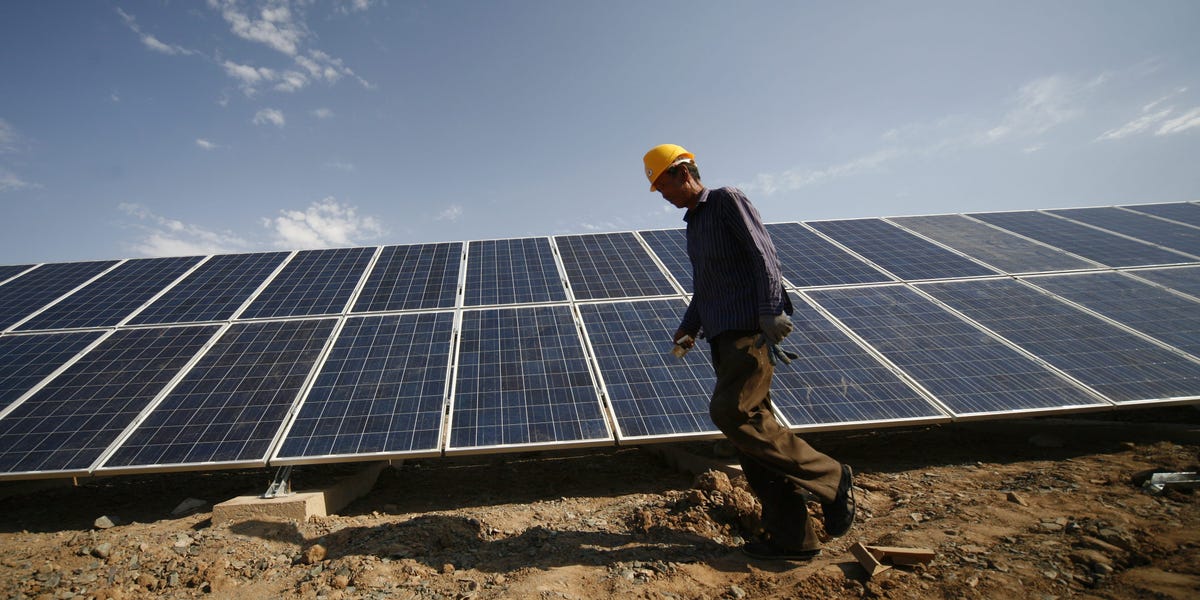Researchers: Forced labor in China’s Solar Panel Supply Chain
- New research shows that the Uyghurs are the largest solar producers in the world.
- Breakthrough Institute reports Uyghur workers extracting and developing raw materials in difficult conditions.
- The growth of the global solar supply chain could be threatened by the alleged use Uyghur forced labor.
According to Human Rights Watch, the global solar panel manufacturing industry poses a problem for human rights. new researchThe Breakthrough Institute draws on more than 200 government documents, media reports, as well as academic papers.
According to the research report, Uyghurs, a Muslim minority group based in Xinjiang (China), were forced to produce polysilicon. It is a key material used for making solar panels. Researchers claim that these arrangements have led to the “implicit” threat or imprisonment of minority workers in factory jobs.
Biden Administration criticized China’s treatment Uyghurs “genocide”In its 2021 Human Rights Report.
The research shows that China’s polysilicon factories are concentrated within the Xinjiang region. They were responsible for more 42% of the world’s total production of solar materials last year.
GCL Technology Holdings Limited (which researchers estimate produces 8.4% China’s solar-grade silicon) and other companies assisted in the transfer of more than 1,800 workers from Hotan. They also requested that they take part in military-style training. According to the research report, other polysilicon producers like East Hope Group, Daqo New Energy Corporation and Xinte Energy based out of Xinjiang were also found employing forced labor.
Insider spoke with Kevin He, a spokesperson from Daqo New Energy Corporation. He stated that the Xinjiang manufacturer doesn’t employ Uyghur workers, and that China doesn’t need workers through the labor transfer program.
“Why do people believe that a government will pay money for a company to use forced labor?” In an email, he wrote. “What does the government get?”
GCL Technology Holdings Limited, East Hope Group and Xinte Energy did not respond to a request to comment.
Researchers say Uyghur workers will be expected to work in potentially dangerous conditions and receive low wages.
According to the research report manufacturers in Xinjiang are skilled in upstream production. This involves the mining, smelting, and slicing of silicon into wafers which are used in photovoltaics. These convert sunlight into electricity. Researchers wrote that the rest of the components of solar panels, such as solar cells and panels, are assembled at other plants in China.
According to the study, while there is not enough data to prove how many Uyghurs are in the solar factory workforce, transfer workers are often relocated hundreds and thousands of kilometers away from their homes, separated from their children and families.
According to the report workers are expected work long hours under potentially hazardous conditions with low pay. They also have to undergo mandatory political training as part of their job. re-education process.
The researchers claim that Uyghurs work at the coal-powered power plants in the area and elsewhere. Researchers also claimed that photos taken by them show that workers don’t wear the personal protective equipment required to protect themselves from occupational hazards.
Researchers concluded that solar manufacturing companies are “complicit” in the Chinese Communist Party’s wider systematic campaign against oppression of Uyghurs and Kazakhs, Kyrgyz and other minoritized persons in the Xinjiang area.
China’s dominance in the global solar supply chain could slow the world’s transition towards clean energy.
Many countries, including the US depend on Chinese imports for the majority of their panels. according to Bloomberg. China is responsible almost 80% global solar manufacturing market in all stages. according to data from the International Energy Agency. According to reports, China’s solar exports are reportedly increased by 60% to $28 billion dollarsAccording to China’s ministry for industry and information technology, last year was
Seaver Wang, a researcher, stated that China’s dominance on the global solar market may make the supply chain more vulnerable to disruptions due to geopolitical disputes and extreme weather.
Wang stated that China’s influence could hinder the global expansion in the solar industry if domestic producers are unable to compete in the long-term with low-cost labor in Xinjiang. It could even damage the reputations of solar photovoltaic sectors, which could drive investors away from funding unethical enterprises and reduce the overall shift to solar from fossil fuels, Wang said.
The US passed a law in June of 2021Banning some imports from the Xinjiang Region of solar materials, a move that could increase the cost of switching to solar energy. Australia and the U.K have also considered banning Xinjiang imports, but no decisions have been made.
Researchers urge solar companies to cease doing business with Xinjiang-based manufacturers
Wang stated that even though the solar industry has adopted protocols and pledged to vet products that violate labor law, Wang found that this has not done enough to stop producers at end of supply chain from buying raw materials from Xinjiang.
Researchers urge energy companies not to do business with Xinjiang-based producers. They also demand that governments create public programs such as Biden’s plan to triple US-based solar manufacturing by 2024.
Wang stated that the clean tech industry must send a clear message now that it will not accept sourcing from Xinjiang’s oppressive policies.
Correction: This article has been updated with information that indicates that Hotan was home to more than 1,800 people.
[Denial of responsibility! newsanyway.com is an automatic aggregator of the all world’s media. In each content, the hyperlink to the primary source is specified. All trademarks belong to their rightful owners, all materials to their authors. If you are the owner of the content and do not want us to publish your materials, please contact us by email – at newsanyway.com The content will be deleted within 24 hours.]

